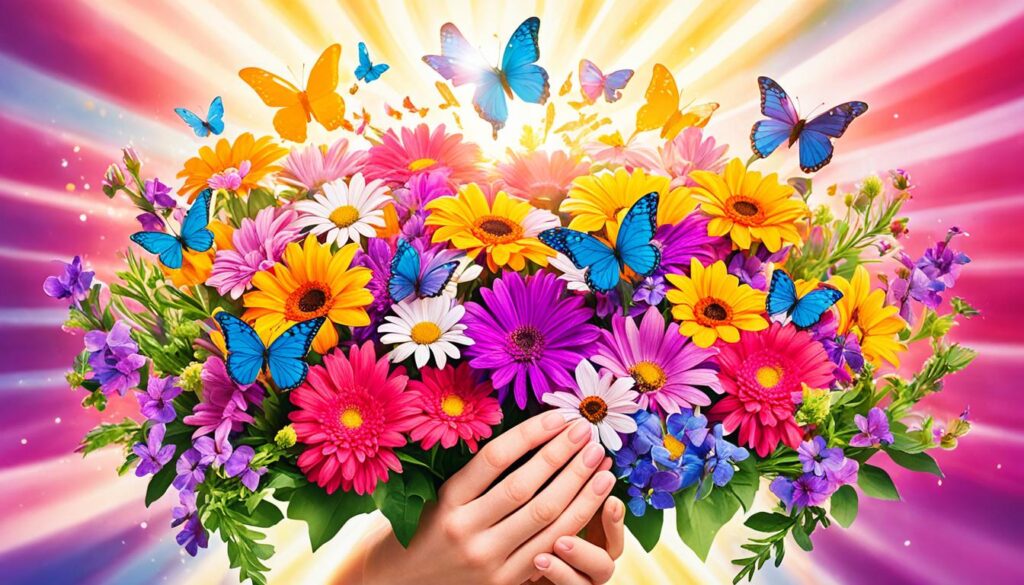“Let us rise up and be thankful, for if we didn’t learn a lot today, at least we learned a little, and if we didn’t learn a little, at least we didn’t get sick, and if we got sick, at least we didn’t die; so, let us all be thankful.” – Buddha
Gratitude is a powerful emotion that has the potential to transform our lives and the lives of those around us. It is a reminder to acknowledge and appreciate the blessings we have, no matter how big or small. Showing gratitude goes beyond merely saying “thank you”; it is about expressing genuine appreciation and recognizing the value of others in our lives.
In this article, we will explore various ways to express gratitude towards others, the countless benefits of expressing gratitude for life and others, and practical strategies to incorporate gratitude into your daily routine. Whether it’s a simple act of kindness, a heartfelt thank you, or a reminder of the good things in life, expressing gratitude can have a profound impact on our well-being and relationships.
Key Takeaways:
- Gratitude is a powerful emotion that has the potential to transform our lives and the lives of others.
- Expressing gratitude goes beyond saying “thank you”; it is about genuine appreciation and recognizing the value of others.
- Show gratitude through simple acts of kindness, heartfelt thank yous, and reminders of the good things in life.
- Expressing gratitude has countless benefits for our well-being and relationships.
- Incorporate gratitude into your daily routine to experience its profound impact.
How Can We Best Express Gratitude Towards Others?
Gratitude is a powerful tool that can positively impact our lives when we incorporate it into our daily routines. Expressing gratitude not only benefits the recipient but also creates a self-perpetuating cycle of positivity. When it comes to expressing gratitude towards others, there are numerous ways to do so effectively.
- Random acts of kindness: Small gestures like offering a helping hand, writing a thoughtful note, or surprising someone with their favorite treat can go a long way in showing appreciation.
- Being respectful: Simple acts of courtesy, such as saying “please” and “thank you,” can demonstrate gratitude for others’ time, effort, and contributions.
- Tipping servers: In situations where service is provided, like at a restaurant or cafe, leaving a generous tip is an expression of gratitude for the hard work and dedication of the staff.
- Volunteering in the community: Giving back to the community through volunteer work is a meaningful way to show appreciation for the opportunities and support received from others.
Remember, expressing gratitude towards others should be genuine and heartfelt. It’s the thought and effort behind the act that truly matters. Find the methods that resonate with you the most, and make an effort to incorporate them into your daily interactions. Your appreciation is not only a gift to others but also a beautiful reflection of your own character.

The Benefits of Expressing Gratitude For Life and Others
Expressing gratitude is more than just saying “thank you.” It holds tremendous power to positively impact our lives and the lives of those around us. When we express gratitude for life and others, we unlock a myriad of benefits for our psychological, social, and physical well-being.
The Psychological Benefits of Gratitude
Practicing gratitude has been shown to have profound psychological benefits. It can improve our overall well-being and increase happiness levels. By acknowledging and appreciating the good things in our lives, we shift our focus from negativity to positivity, leading to a more optimistic outlook.
Research suggests that when we regularly express gratitude, it stimulates the release of neurotransmitters like dopamine and serotonin, which are associated with happiness and well-being. This can help reduce symptoms of depression, anxiety, and stress, promoting mental resilience and emotional well-being.
The Social Benefits of Gratitude
Expressing gratitude also strengthens social relationships and fosters a sense of connection and belonging. When we express gratitude towards others, it cultivates feelings of appreciation, respect, and reciprocity. This, in turn, builds deeper connections and strengthens bonds with friends, family, colleagues, and even strangers.
Grateful individuals are more likely to exhibit prosocial behavior and engage in acts of kindness. They are seen as more likable, trustworthy, and compassionate, enabling them to form and maintain meaningful relationships. Expressing gratitude creates a positive social environment that promotes cooperation, empathy, and collaboration.
The Physical Health Benefits of Gratitude
Believe it or not, expressing gratitude can also benefit our physical health. Research has shown a correlation between grateful individuals and improved physical well-being. Gratitude has been linked to reduced inflammation, improved sleep quality, lowered blood pressure, and a strengthened immune system.
When we express gratitude, it helps us shift our focus from stressors and negative emotions to positive thoughts and experiences. This shift positively impacts our body’s stress response, reducing chronic stress and its detrimental effects on our physical health.

Image: A picture of a person meditating, representing the physical health benefits of gratitude.
| Benefits of Expressing Gratitude | Physical | Psychological | Social |
|---|---|---|---|
| Improved overall well-being | ✓ | ✓ | ✓ |
| Increased happiness levels | ✓ | ✓ | ✓ |
| Reduced symptoms of depression, anxiety, and stress | ✓ | ✓ | |
| Strengthened social relationships | ✓ | ||
| Promotion of prosocial behavior | ✓ | ||
| Improved physical health | ✓ |
Table: Summary of the benefits of expressing gratitude for life and others.
Expressing gratitude is a powerful practice that brings immense benefits to our lives. It enhances our psychological well-being, strengthens our social connections, and improves our physical health. By incorporating gratitude into our daily lives, we can cultivate happiness, foster meaningful relationships, and create a truly fulfilling existence.
7 Ways to Express Thanks and Gratitude to Friends, Teachers, and Parents
When it comes to expressing gratitude to the people who have played a significant role in your life, sincerity and thoughtfulness are key. Whether it’s your friends who have always been there for you, your teachers who have guided you along the way, or your parents who have provided endless love and support, finding meaningful ways to show your appreciation can make a lasting impact. Here are seven heartfelt ways to express thanks and gratitude to these important individuals:
- Show Extra Enthusiasm: When expressing your gratitude, let your emotions shine through. Smile, use a warm and enthusiastic tone, and maintain eye contact to convey your genuine appreciation. Small gestures like a heartfelt thank you or a warm hug can go a long way in showing your gratitude.
- Vary Your Vocabulary: Avoid repetitiveness by using different words to express your gratitude. Highlight specific qualities or actions that you are grateful for, such as their patience, guidance, or generosity. This not only shows that you have taken the time to reflect on their impact but also adds depth and sincerity to your expression of thanks.
- Get Specific: Be specific about what you’re grateful for. Instead of a general “thank you,” mention a particular act or moment that touched your heart. For example, you could say, “I am truly grateful for the time you stayed up late to help me with my project. Your support and dedication mean the world to me.”
- Make it Public: Publicly acknowledging someone’s impact can be a powerful way to express gratitude. Take the opportunity to express your appreciation in front of others, such as during a speech, a gathering, or a special event. Not only will this make the person feel valued, but it will also inspire others to practice gratitude.
- Share a List of Your Favorite Things: Create a list of all the things you love and appreciate about the person. It could be their qualities, their achievements, or even the memories you’ve shared together. Presenting them with this list is a thoughtful way to let them know how much they mean to you.
- Write a Handwritten Letter: In this digital age, a handwritten letter holds a special place in expressing gratitude. Pour your heart out on paper, sharing your thoughts, feelings, and appreciation. The effort and personal touch of a handwritten letter will make it a cherished keepsake for the recipient.
- Give Extra Encouragement: Show your gratitude by providing extra support and encouragement to the people who have made a difference in your life. It could be cheering them on during their endeavors, lending a helping hand when needed, or simply being there to listen and offer guidance. Your words and actions can fuel their motivation and reinforce the importance of their presence in your life.
Expressing Gratitude through Actions
Remember, expressing thanks and gratitude is not only about the words we say but also the actions we take. A kind gesture, an act of service, or simply spending quality time with the people you appreciate can speak volumes. Let your gratitude shine through in your interactions and make an effort to show how much you value their presence in your life.

| Ways to Express Thanks and Gratitude | Benefits |
|---|---|
| Show Extra Enthusiasm | Creates a positive and joyful atmosphere, strengthens relationships |
| Vary Your Vocabulary | Adds depth and sincerity to your expression of thanks |
| Get Specific | Highlights the impact and shows thoughtful reflection |
| Make it Public | Boosts the recipient’s self-esteem and inspires others to practice gratitude |
| Share a List of Your Favorite Things | Provides a tangible reminder of the appreciation and reinforces the bond |
| Write a Handwritten Letter | Offers a personal touch and creates a keepsake |
| Give Extra Encouragement | Motivates and reinforces the recipient’s significance in your life |
How to Practice Gratitude
Practicing gratitude can have a transformative effect on your life. It allows you to shift your focus towards the positive aspects, cherish good experiences, and deepen your appreciation for what you have. By incorporating daily gratitude practices into your routine, you can cultivate a mindset of thankfulness and experience the benefits it brings.
Keeping a Gratitude Journal
One effective way to practice gratitude is by keeping a gratitude journal. Take a few minutes each day to write down three things you are grateful for. These can be big or small, such as a supportive friend, a delicious meal, or a beautiful sunset. Reflecting on these moments of gratitude helps train your brain to notice the positive aspects of your life and fosters a sense of appreciation.
Remembering the Bad Times
While it may seem counterintuitive, reflecting on difficult times can actually enhance your gratitude. By recalling challenging moments and comparing them to your current situation, you gain perspective and a deeper appreciation for the positive aspects of your life. The contrast between past hardships and present blessings can amplify your sense of gratitude.
Asking Yourself Three Questions
Each day, ask yourself three questions related to gratitude. Start with “What am I grateful for today?” to prime your mind for positive thoughts. Then, ask “Who am I grateful for in my life?” to acknowledge the people who bring joy and support. Finally, ask “What did I learn today?” to find gratitude in the lessons and growth you experience daily.
Sharing Gratitude with Others
Expressing gratitude to others not only benefits them but also deepens your own appreciation. Take the time to thank someone who has made a positive impact on your life. It can be a simple message, a heartfelt conversation, or a handwritten note expressing your gratitude. Sharing your appreciation reinforces the positive connection between gratitude and well-being.
Using Visual Reminders
Create visual reminders in your daily life to prompt moments of gratitude. Place post-it notes with inspiring quotes or affirmations in visible areas, use screensavers or wallpapers with gratitude-related images, or wear a piece of jewelry that symbolizes thankfulness. These visual cues serve as gentle reminders to pause, reflect, and feel grateful throughout your day.
By incorporating these daily gratitude practices into your life, you can cultivate a mindset of appreciation and experience the transformative power of gratitude.

Watch Your Language: The Power of Words in Expressing Gratitude
The way we express gratitude through words has a significant impact. Grateful people have a specific linguistic style that uses the language of gifts, givers, blessings, and abundance. It is important to vary your vocabulary and use specific, heartfelt phrases to convey your appreciation. Additionally, non-verbal cues and actions can also communicate gratitude effectively.
Language of Gratitude: The Key to Unlocking the Power of Words
When expressing gratitude, the language we use plays a vital role. Grateful individuals have a unique way of speaking that centers around the concepts of giving, receiving, and abundance. By adopting this linguistic style, we tap into the power of words to convey our thankfulness in a meaningful and impactful way.
For example, instead of saying, “Thank you for your help,” you can say, “Your assistance has been an invaluable gift to me.”
Varying your vocabulary and finding specific, heartfelt phrases not only adds depth and sincerity to your expressions of gratitude but also shows the recipient that their actions had a profound impact.
Non-Verbal Cues: The Silent Language of Gratitude
While words are powerful, actions can also speak volumes. Non-verbal cues, such as a warm smile, a sincere hug, or a handwritten note, are all ways to communicate gratitude without saying a word.
When expressing gratitude, consider accompanying your words with a small gesture that reflects your appreciation. It could be a simple act like holding the door open for someone or offering a helping hand when needed.
Expressions of Gratitude: Letting Your Appreciation Shine
There are countless ways to express gratitude, both through words and actions. Here are some ideas to help you convey your thankfulness:
- Write a heartfelt thank-you letter to express your appreciation.
- Use specific examples to let the person know exactly how their actions made a difference.
- Share your gratitude publicly, whether through social media or in a group setting.
- Create a gratitude jar or journal to document the things you are thankful for.
- Offer to help or support someone in return, showing your gratitude through action.
The key is to find genuine ways to express your gratitude that resonate with both you and the recipient. Remember, a simple “thank you” can go a long way, but using the power of words and actions to convey your thankfulness can create lasting connections and deepen relationships.
| Expressions of Gratitude | Description |
|---|---|
| Thank-you letter | A heartfelt written note expressing appreciation for someone’s kindness or help. |
| Sharing specific examples | Using specific instances to highlight the impact of someone’s actions and how it has positively affected you. |
| Public gratitude | Expressing your thanks openly and publicly, whether through social media or in front of a group. |
| Gratitude jar or journal | A personal practice of documenting the things you are grateful for, helping to cultivate a mindset of appreciation. |
| Offering support | Showcasing your gratitude through action by offering assistance or support to someone in return. |
Conclusion
Expressing heartfelt gratitude is not only a kind gesture but also a transformative practice that brings significant benefits to our lives. By showing appreciation and acknowledging the kindness of others, we not only enrich our relationships but also support our mental and physical well-being. The act of expressing gratitude can truly cultivate a positive mindset and enhance our overall sense of happiness and fulfillment.
There are various ways to show appreciation and express gratitude towards others. Random acts of kindness, respectful behavior, and volunteering in our communities are just a few examples of the many acts of gratitude we can engage in. These acts not only make others feel valued but also contribute to creating a more compassionate and empathetic society.
By incorporating gratitude into our daily lives, we open ourselves up to a world of possibilities. The benefits of expressing gratitude are profound, ranging from strengthening social connections and promoting prosocial behavior to enhancing our overall well-being and improving physical health. Grateful individuals are better equipped to navigate challenges, maintain positive emotions, and find fulfillment in life.
As we conclude this article, remember that showing gratitude is a reflection of our appreciation for the significant impact others have on our lives. Let us strive to express heartfelt gratitude and show appreciation in our relationships, families, workplaces, and communities. By doing so, we create a positive ripple effect that can bring joy, connection, and meaning to ourselves and those around us.
FAQ
What is gratitude?
Gratitude is a general state of thankfulness and appreciation.
What are the benefits of expressing gratitude?
Expressing gratitude can strengthen social relationships, promote well-being, increase happiness, and improve physical health.
How can we best express gratitude towards others?
Some ways to express gratitude towards others include random acts of kindness, being respectful, tipping servers, and volunteering in the community.
How can I express thanks and gratitude to friends, teachers, and parents?
You can show extra enthusiasm, vary your vocabulary, get specific about what you’re grateful for, make the expression public, share a list of your favorite things about them, write a handwritten letter, and give them extra encouragement.
How can I practice gratitude?
You can keep a gratitude journal, remember the bad times, ask yourself three questions, share gratitude with others, and use visual reminders.
What is the power of words in expressing gratitude?
The way we express gratitude through words has a significant impact. Grateful people have a specific linguistic style that uses the language of gifts, givers, blessings, and abundance.
How can expressing gratitude enrich our relationships and well-being?
Expressing gratitude is a powerful way to enrich relationships, support mental and physical well-being, and cultivate a positive mindset.

